AirParma: NSYSU’s new development to fight COVID-19
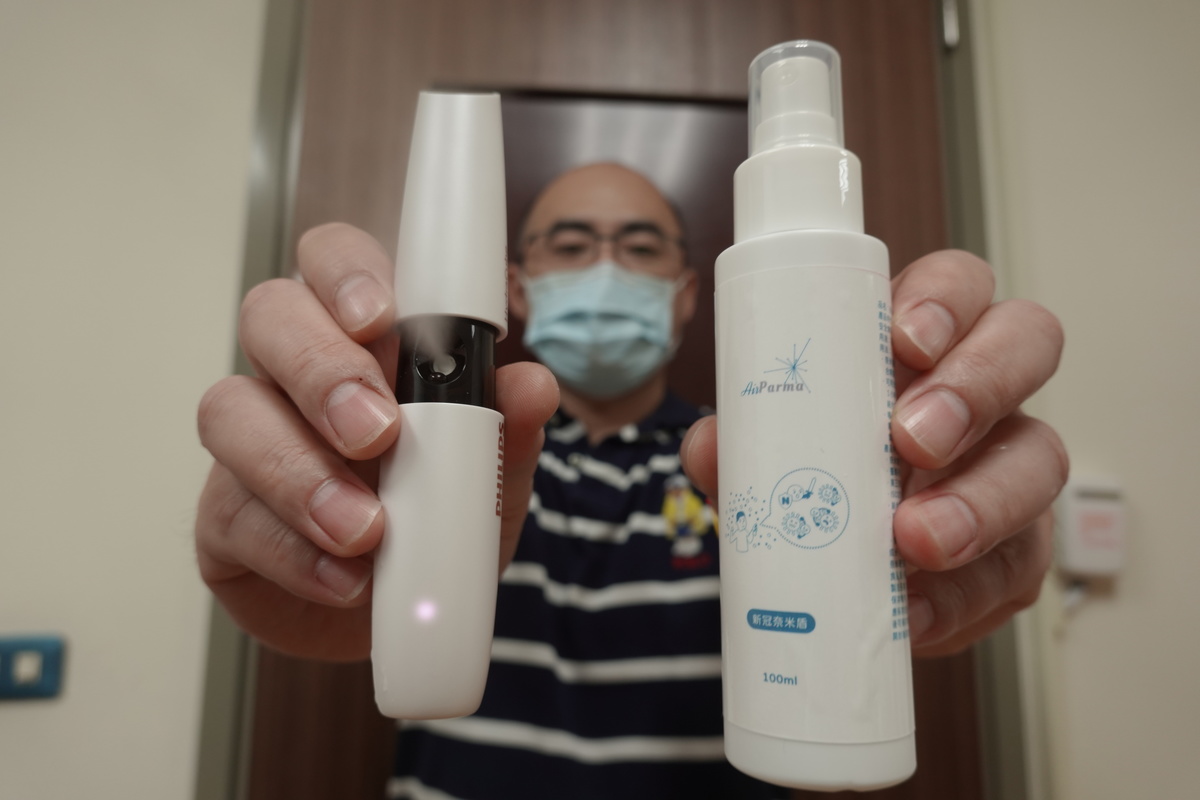
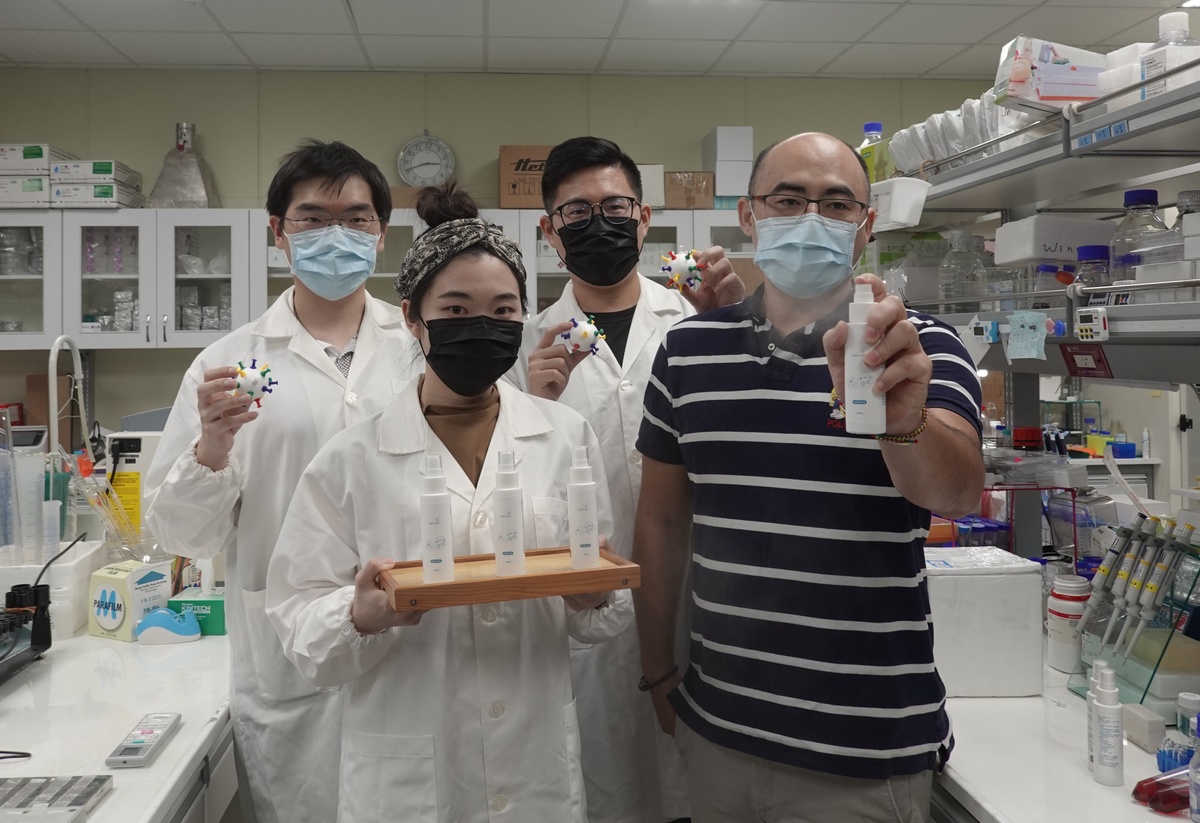
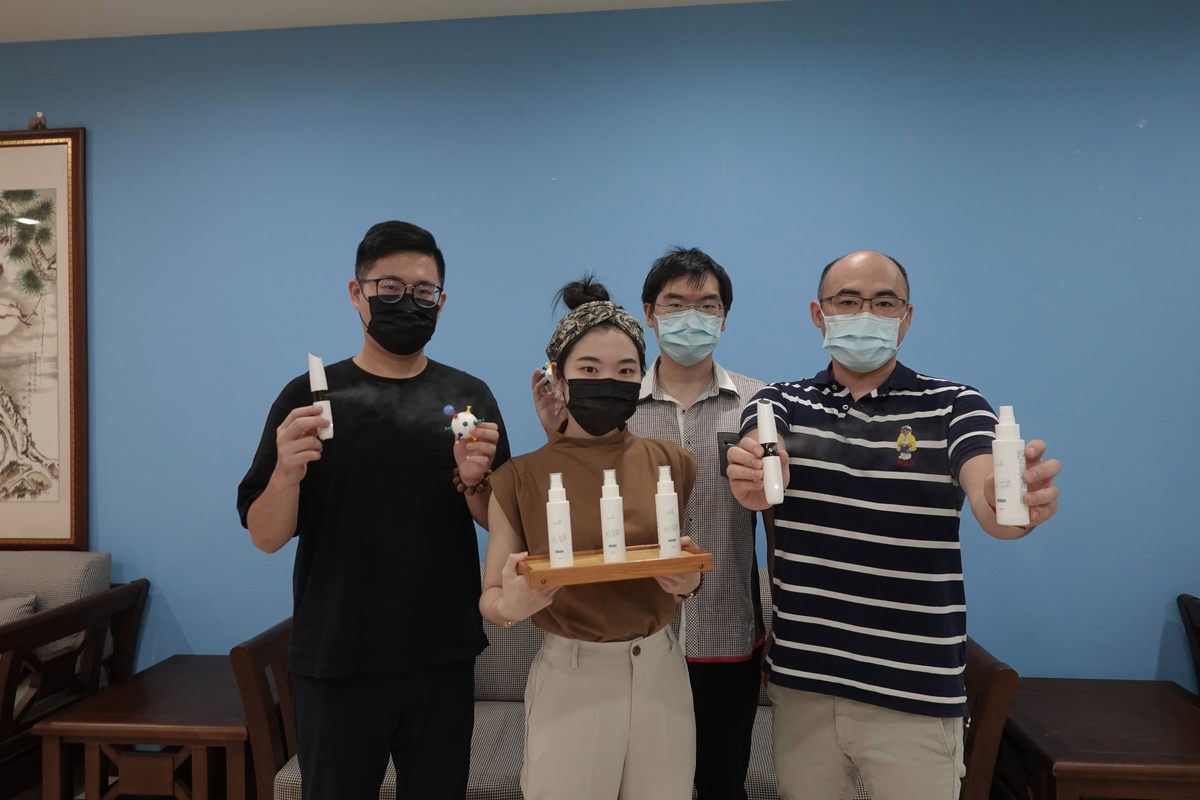
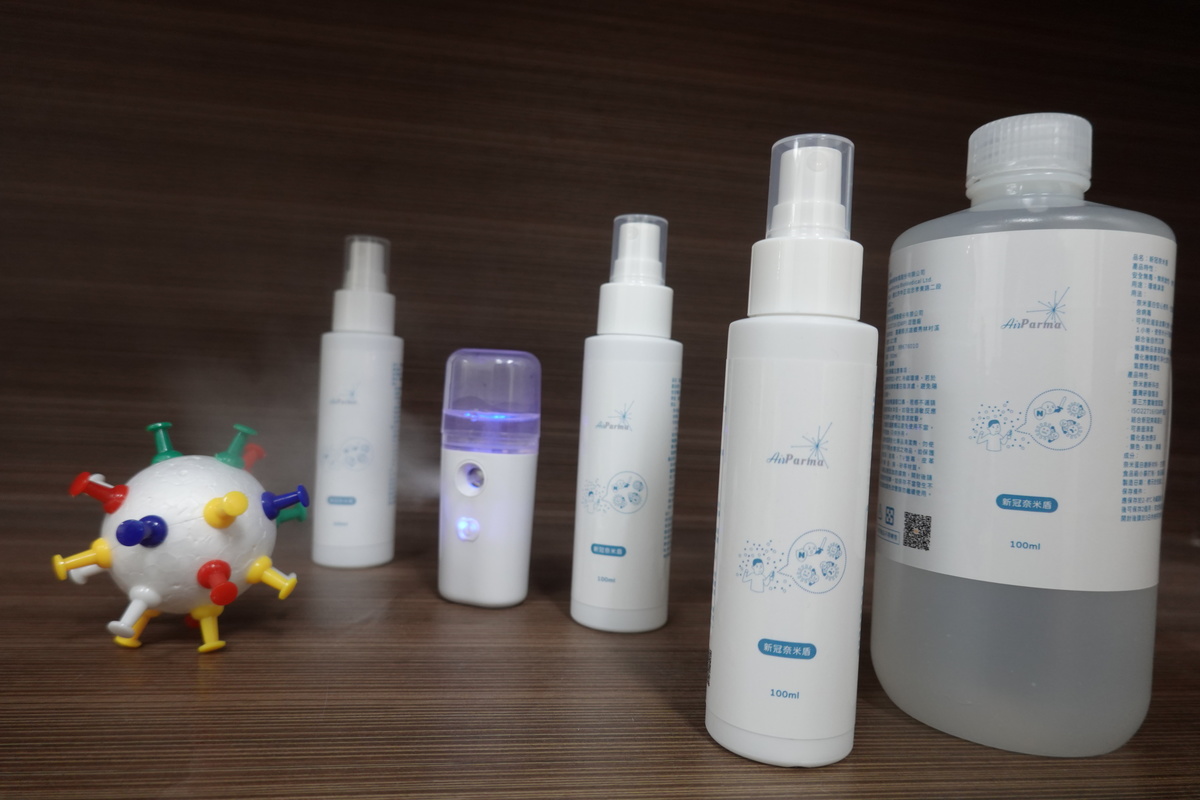
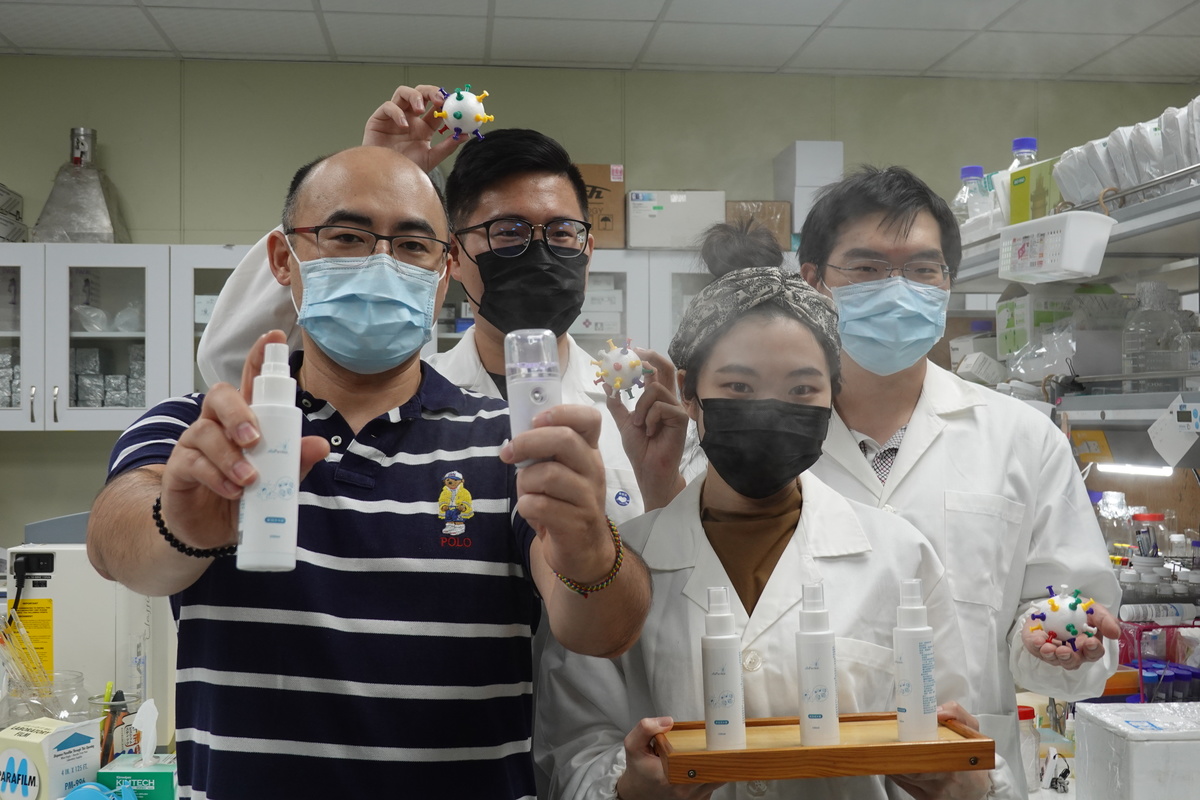
2021-06-21
National Sun Yat-sen University developed an “anti-aircraft missile” to fight SARS-CoV-2-laden aerosols floating in the air. The research team of Associate Professor Hung-Wei Yang of the Institute of Medical Science and Technology (IMST) at NSYSU used protein expression technology to develop AirParma – non-toxic, non-irritant suspended particles, which, diffused with an ultrasound nebulizer (mist spray), can float in the air for up to 2 hours, capturing and grounding virus-laden aerosols through the binding with receptor binding domain (RBD) on spiked protein. Within just 30 minutes, AirParma can catch 40-60% virus-laden aerosols and lower the risk of virus transmission via aerosols. AirParma is different from such chemical disinfectants as alcohol or hypochlorous acid.
The research team pointed out that WHO has already announced that aerosols are the main route of transmission of SARS-CoV-2. When facing the threat of the pandemic, besides face-masking, reducing the amount of virus-laden aerosols floating in the air is of utmost priority. Alcohol and hypochlorous acid sprays and ozone generators available on the market can fight SARS-CoV-2 but would also cause mucus and skin irritation or even serious allergies and thus are more suitable for external use and cannot be diffused in the air for long enough to accumulate effective concentration, resulting in limited effectiveness against the spread of airborne viruses.
A cross-disciplinary research team led by Professor Yang of IMST and three PhD students – Ying-Pei Hsu of the Department of Materials and Optoelectronic Science, Nan-Hsi Li and Hao-Han Pang of the Institute of Biomedical Science successfully applied protein technology to develop AirParma suspension particles, which can biologically block and ground SARS-CoV-2 virus-laden aerosols in the air. Professor Yang said that the AirParma can catch 40-60% virus-laden aerosols within 30 minutes, not allowing them to bind with angiotensin converting enzyme II (ACE2) lung alveolar epithelial cells, and thus lowering the risk of virus transmission via aerosols. Animal testing has also shown that even if inhaled for two weeks, AirParma does not cause serious irritation to the respiratory tract nor trigger extreme immune responses. In contrast to such chemicals as alcohol, hypochlorous acid, or ozone, it not only causes less irritation but can also degrade in the natural environment and does not encumber it.
“AirParma is a more active anti-epidemic measure to take in addition to keeping social distance, using filters and wearing face masks.” The research team emphasized that AirParma is mainly intended for use in confined spaces, where the risk of infection is high: such as aircraft cabins, carriages, indoor spaces and can be used during flights, in quarantine hotels, in means of transportation to quarantine facilities, for business meetings, and in restaurants to immediately capture and ground viruses floating in the air to prevent the spread of the epidemic. The technology has been licensed to NanoParma Biomedical, a start-up company dedicated to scientific research and entrepreneurship, and is now entering the stage of mass production and will soon join the epidemic prevention frontline.
Last year, the research team of Professor Yang has successfully developed a COVID-19 antibody test in vials for emergency rapid screening within 7 days from the onset of symptoms in individuals and is ready for pilot production in early June. The blueprint for this development was the air defense system, and the “nano-shield” acts as an “anti-aircraft missile” to attack airborne virus particles, and is expected to contribute to epidemic prevention.
National Sun Yat-sen University developed an “anti-aircraft missile” to fight SARS-CoV-2-laden aerosols floating in the air. The research team of Associate Professor Hung-Wei Yang of the Institute of Medical Science and Technology (IMST) at NSYSU used protein expression technology to develop AirParma – non-toxic, non-irritant suspended particles, which, diffused with an ultrasound nebulizer (mist spray), can float in the air for up to 2 hours, capturing and grounding virus-laden aerosols through the binding with receptor binding domain (RBD) on spiked protein. Within just 30 minutes, AirParma can catch 40-60% virus-laden aerosols and lower the risk of virus transmission via aerosols. AirParma is different from such chemical disinfectants as alcohol or hypochlorous acid.
The research team pointed out that WHO has already announced that aerosols are the main route of transmission of SARS-CoV-2. When facing the threat of the pandemic, besides face-masking, reducing the amount of virus-laden aerosols floating in the air is of utmost priority. Alcohol and hypochlorous acid sprays and ozone generators available on the market can fight SARS-CoV-2 but would also cause mucus and skin irritation or even serious allergies and thus are more suitable for external use and cannot be diffused in the air for long enough to accumulate effective concentration, resulting in limited effectiveness against the spread of airborne viruses.
A cross-disciplinary research team led by Professor Yang of IMST and three PhD students – Ying-Pei Hsu of the Department of Materials and Optoelectronic Science, Nan-Hsi Li and Hao-Han Pang of the Institute of Biomedical Science successfully applied protein technology to develop AirParma suspension particles, which can biologically block and ground SARS-CoV-2 virus-laden aerosols in the air. Professor Yang said that the AirParma can catch 40-60% virus-laden aerosols within 30 minutes, not allowing them to bind with angiotensin converting enzyme II (ACE2) lung alveolar epithelial cells, and thus lowering the risk of virus transmission via aerosols. Animal testing has also shown that even if inhaled for two weeks, AirParma does not cause serious irritation to the respiratory tract nor trigger extreme immune responses. In contrast to such chemicals as alcohol, hypochlorous acid, or ozone, it not only causes less irritation but can also degrade in the natural environment and does not encumber it.
“AirParma is a more active anti-epidemic measure to take in addition to keeping social distance, using filters and wearing face masks.” The research team emphasized that AirParma is mainly intended for use in confined spaces, where the risk of infection is high: such as aircraft cabins, carriages, indoor spaces and can be used during flights, in quarantine hotels, in means of transportation to quarantine facilities, for business meetings, and in restaurants to immediately capture and ground viruses floating in the air to prevent the spread of the epidemic. The technology has been licensed to NanoParma Biomedical, a start-up company dedicated to scientific research and entrepreneurship, and is now entering the stage of mass production and will soon join the epidemic prevention frontline.
Last year, the research team of Professor Yang has successfully developed a COVID-19 antibody test in vials for emergency rapid screening within 7 days from the onset of symptoms in individuals and is ready for pilot production in early June. The blueprint for this development was the air defense system, and the “nano-shield” acts as an “anti-aircraft missile” to attack airborne virus particles, and is expected to contribute to epidemic prevention.
Click Num:
Share
